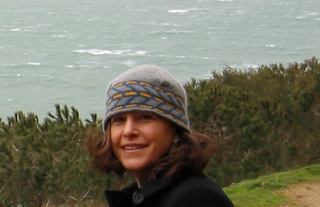27 October 2014
Teaching an ever-elusive art: 'Living a sensory-rich life is the best kind of poetry'

Christina Burress: "Writing poetry is how I translate and understand my experiences."
INSTRUCTOR PROFILE: TEN QUESTIONS
A published poet and teacher, Christina Burress has taught a wide range of poetry classes at UC San Diego Extension over the past four years.
A graduate of UC Berkeley (rhetoric) with a masters (creative writing) from Naropa University in Boulder, Colorado, Burress teaches middle school and high school English at The Grauer School in Encinitas.
She also spent five years as a California Poet in The Schools, working as a poet-in-residence at various San Diego county elementary schools.
Prior to moving to San Diego in 2006, she and her family spent five years abroad in France, China and Germany.
Currently, Burress teaches two Extension courses — Introduction to Poetry (Nov. 11-Dec. 9) and Forms of Poetry (Jan. 13-March 17).
1) Why do you write poetry?
Writing poetry is how I translate and understand my experiences. It’s how I translate what I am experiencing into pieces that point out the humorous or absurd or satirical or ironic or real moments.
2) How old were you when you wrote your first poem?
I wish I could remember. What I do remember is reading "Firstborn," poems by Louise Glück, when I was a senior in college and feeling like it was a long-awaited invitation to play with words.
3) Where do your poems come from?
Some come from the muse, some from the absurd, humorous, ironical or mundane moments of life. Many poems are part of a larger conversation that is going on between all sorts of art work.
4) Is it really possible to teach how to write poetry?
It is possible to teach poetry. Noticing the world around us is key. If you are awake, then you can see the world as a poet does. The poet sees the world as a teacher and the teacher provides many prompts.
5) Do you write poetry most for your own creative outlet, or for others to read?
I have a terrible memory, so I write poetry to not forget.
6) What do you hope your students to learn from taking your courses?
I hope my students learn that they can engage with their senses and experience life in a poetic way. If they continue to write poetry, that’s great. But living a sensory-rich life is the best kind of poetry.
7) What were the benefits – for you and the prisoners – of reading poetry at Donovan Prison?
At the time I was volunteering at Donovan, I shared poems that brought in something beautiful from the outside. Mary Oliver’s "Wild Geese" had a wide appeal and inspired many of the inmates to write their own poetry.
8) Are young children – even the very young – naturally better poets than, say, their parents?
Young children are honest and revealing poets. Their confident and colorful words fly and soar right into the listener’s heart. They haven’t learned to hold back yet – that’s really the biggest difference.
9) What’s your favorite poem of all time, one that’s always with you?
I love Homer's "Odyssey" because it’s still relevant today. My favorite poem to teach to students is a poem by Andrea Gibson called, “A Letter to a Playground Bully, from Andrea, Age 8 ½."
10) What’s your most recent discovery in poetry?
Lately, I’ve been caught up in the work of New York poet laureate Marie Howe.